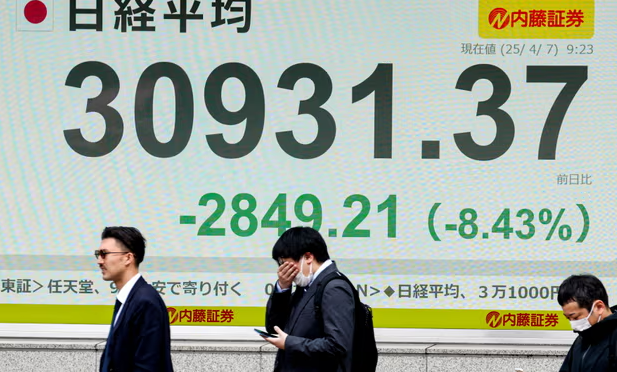
Asian Markets Experience Significant Declines Amid Trade Tensions
Asian stock markets tumbled sharply in the wake of renewed trade tensions, triggered by U.S. President Donald Trump’s firm stance on tariff policies. The shockwaves were felt across the region, with major indices posting steep losses as investors reacted to fears of a prolonged global trade war.
Japan’s Nikkei 225 index led the downturn, plunging nearly 8% in a single trading session—its worst drop since the early days of the COVID-19 pandemic. The selloff was echoed in other major markets: Hong Kong’s Hang Seng Index fell over 6%, Taiwan’s TAIEX declined by 5.3%, and South Korea’s KOSPI shed 4.9%. In Southeast Asia, Singapore’s Straits Times Index dropped 4.5%, while Australia’s ASX 200 retreated by 3.8%.
The market rout follows President Trump’s reaffirmation of a hardline approach to tariffs on Chinese goods, signaling no immediate plans for de-escalation. The announcement dashed investor hopes for a near-term resolution to the ongoing trade dispute between the U.S. and China, which has already weighed heavily on global growth projections.
Financial analysts warn that the growing protectionist rhetoric could tip the world economy closer to recession. “The sharp correction in Asian equities reflects deepening concerns about global supply chain disruptions and the weakening outlook for exports,” said Li Cheng, an economist at the Asia-Pacific Economic Research Institute. “If the current trajectory continues, we could be looking at systemic risks for emerging markets and even developed economies.”
Currency markets also showed signs of stress, with the Chinese yuan falling to its lowest level against the U.S. dollar in nearly a year. Safe-haven assets such as gold and U.S. Treasury bonds surged as traders sought stability amid the volatility.
Regional policymakers now face mounting pressure to implement stimulus measures to cushion the economic blow. Central banks in Japan, South Korea, and Australia have signaled openness to further interest rate cuts, while fiscal authorities in several countries are reportedly considering targeted support for export-dependent industries.
As markets brace for further developments, all eyes remain on the next moves by both Washington and Beijing, with investors hoping for signs of diplomatic engagement to prevent a full-scale trade war.
Author: Global Ripple
Posted on: April 07, 2025
 Global Ripple
Global Ripple